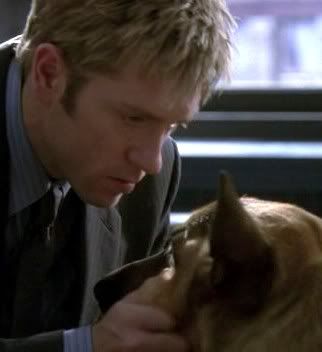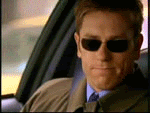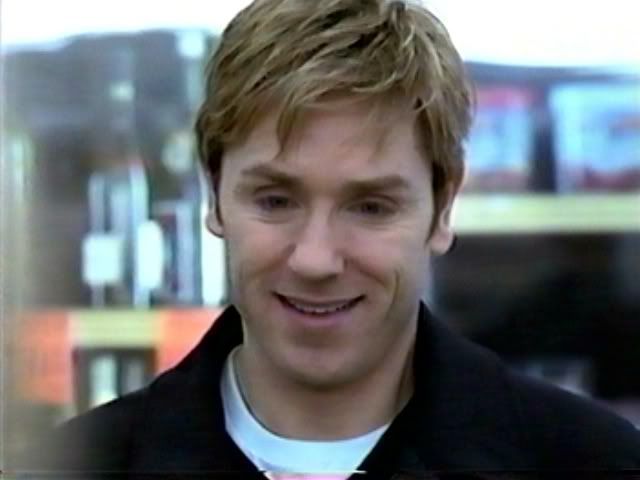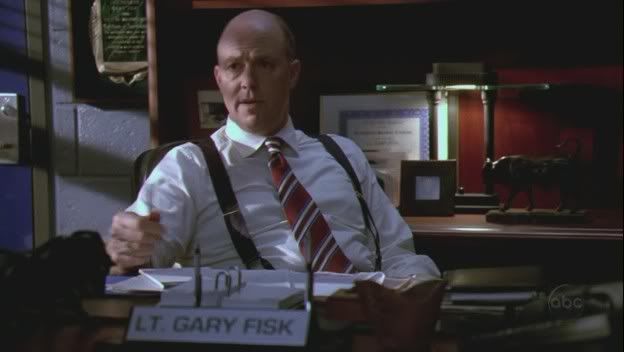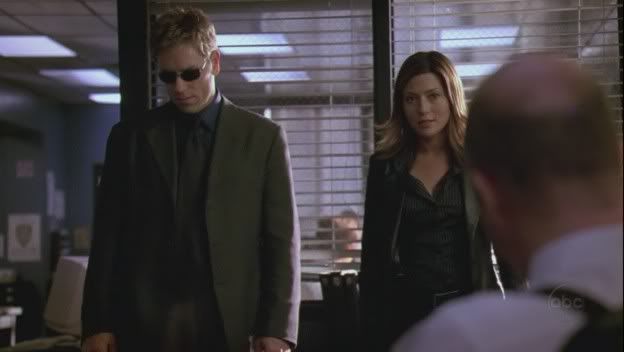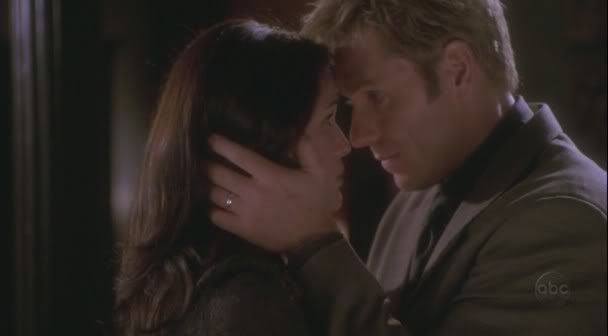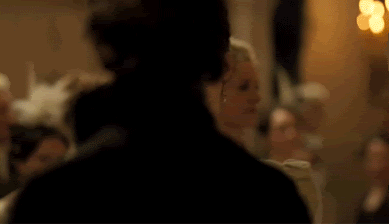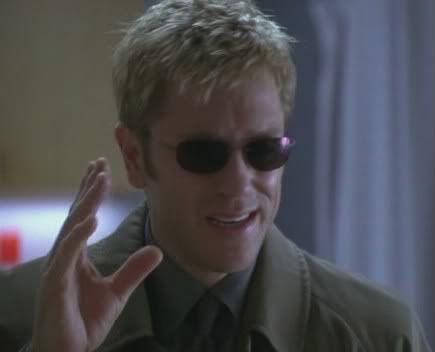Post by mlm828 on Nov 26, 2005 1:02:09 GMT -5
To me, the most fascinating relationship in the series is Jim and Marty, mostly because nothing is ever simple or straightforward.
In the Pilot, Marty’s sour “We know,” in response to Jim’s statement that he’s assigned there, tells us (if we didn’t already know) that this guy is going to be Trouble.
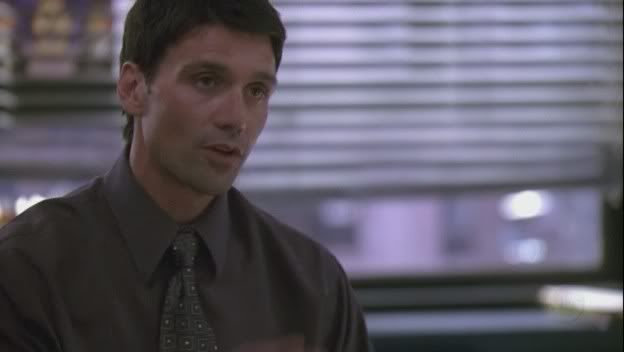
Later, Jim’s challenge to Marty to take his gun, if he can, sets up Marty’s basic dilemma. He can’t physically fight Jim or force him out of the squad without being viewed as the bully. But if Jim “wins,” Jim will then be “the king.” Marty can’t win either way, and he seems to realize this on Jim’s second day back at work. Perhaps this is the origin of the nastiness which follows.

Then Jim makes Marty’s dilemma even worse by solving the “tongue collector” case, using a clever ruse to get Lyman to confess after Marty and Tom had worked on him for more than an hour, and demonstrating along the way that he is capable of defending himself and his gun, when Lyman tries to grab the gun.

Now this is a real problem for Marty, because he’s basically an honorable guy, who will give credit where credit is due. If Jim can close cases, what does this do to his basic belief that a blind man should not be a detective? Further complicating matters is the fact that Jim is a bona fide hero. Marty has to respect that, even if he sometimes seems to do so grudgingly (his “balls of steel at the bank robbery” remark, for example). And Jim doesn’t make things easy, either for himself or for Marty. As Karen astutely points out, his “bull in a china shop” approach alienates both Marty and Tom. But in his understandable desire to prove himself, Jim can only keep doing what he’s doing, at least at first.
One thing everyone can probably agree on is that Marty has a wicked and (at times) even cruel sense of humor. Not surprisingly, most of his humor is at Jim’s expense, and he is the only major character (as far as I can recall) who makes fun of Jim’s blindness. Some notable examples: His answer, “Bin Laden,” when the Criders’ dog is dug up in “Four Feet Under” and Jim asks what was found. And, of course, the “Helen Keller moment” comment when Karen draws Cheryl Vitti’s wound on Jim’s face, followed by his offer to draw a map on Jim’s face of the location of Condell’s apartment.
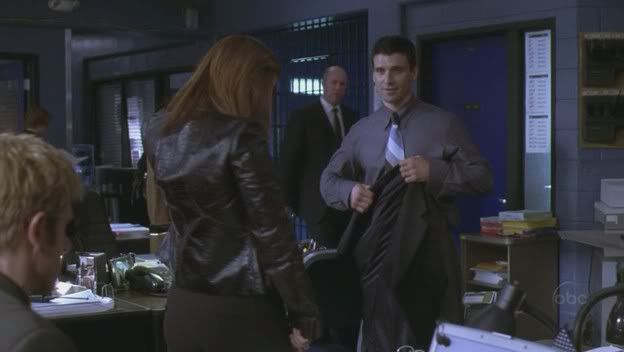
Does he make these kinds of jokes because he just isn’t a politically correct kind of guy? Or is it because he is not about to cut Jim any slack and thinks that if Jim is on the job, he should be able to handle this kind of thing? Or is he simply determined to make Jim’s return to work as difficult as possible, in hopes of forcing him to quit, because he thinks Jim shouldn’t be on the job?
In “Rub a Tub Tub,” it is apparent that the Jim-Marty conflict isn’t going to be resolved anytime soon. Marty moves his desk to retrieve a quarter and later leaves a chair out of place, and Jim runs into each of them. It is debatable whether Marty deliberately moved the furniture to trip up Jim, at least the first time, but he’s not displeased when the collisions occur. On the second occasion, Jim is clearly very angry, and he slams the chair back into place, scaring Hank.
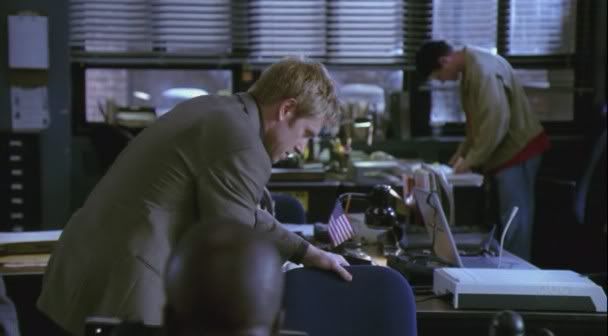
This sets up the first memorable locker room confrontation between Jim and Marty. In spite of his anger, Jim extends an olive branch to Marty, telling him if he can ever do anything for him, he will do it, and asking if that isn’t preferable to their getting dug in. Marty is having none of it. He proposes taking up a collection to buy bells to put on the detectives and the furniture. Somehow refusing to be provoked, Jim tells Marty, “This is going to stop. I work here now, and I’m not going anywhere.” Marty responds with an implied threat, “Good luck with that.”
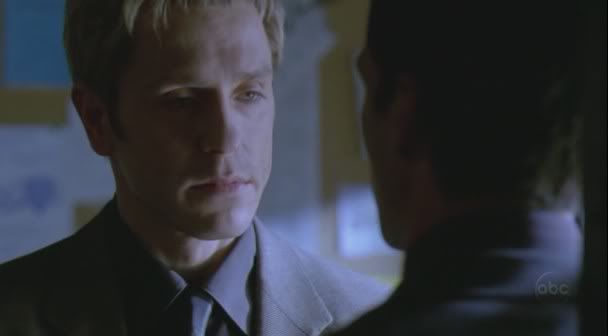
After the confrontation, the hostilities continue and even escalate in “Marlon’s Brando.” Jim suggests he and Marty need to “take a walk,” but when Fisk hears the comment, he warns both of them that the next one to make a comment will take a “rip.” When Jim and Karen return to the squad after Condell’s suicide, Marty seizes the opportunity to tell Jim that if anything had happened to Karen, he would have made it his life’s work to see Jim off the job.
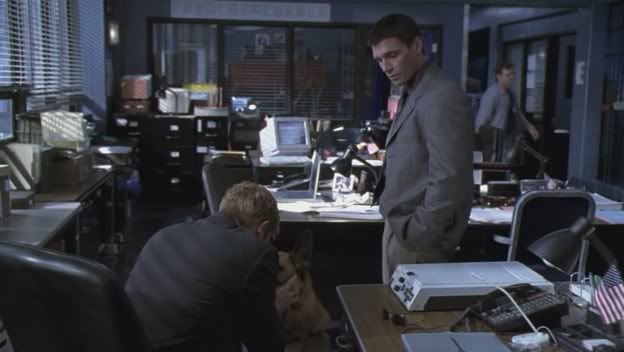
For once, Jim has no response, probably because if anything had happened to Karen because of his inability to protect her, Marty would not have had to do anything to get Jim off the job.
In “Seoul Man,” the conflict escalates further. Kicking Jim when he’s down, Marty repeatedly reminds him of his failure to catch the perp at the robbery/homicide. This is one of the times when I truly dislike Marty. It’s also becoming painfully obvious (except, perhaps, to Jim and Marty) that everyone else in the squad is becoming tired of their continuous animosity and sniping. Fisk isn’t going to put up with it any more, and he calls them into his office, where he demands to know when they’re going to stop acting like “pissed off stepsisters.”
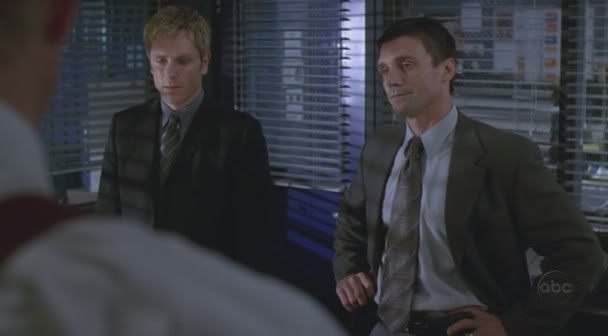
Even Fisk can’t end the hostilities, however. When they learn Dorsey was in the military in Korea and Jim tells Marty and Tom they need to talk to him again, Marty starts to go after Jim. Tom has to restrain him and asks Marty what’s wrong with him. Unusually for him, Tom is pretty fed up with Marty in this episode. When Tom says he’s not too proud to learn from Jim, Marty isn’t giving an inch and suggests Tom wear a blindfold. Disgustedly, Tom goes off to check out the witnesses, leaving Marty to stew. Marty finally goes too far with Fisk, when he suggests Jim is only declining an interview because the rest of them are present when Fisk asks him about it. No overtime for Marty this month.
It all culminates, of course, in the locker room. There is little to add to all that has already been said about this amazing scene. Marty knows, as he tells Jim, that he can’t “win,” and Jim knows they’ve got to work things out, because he can’t keep doing this. Marty accepts that Jim isn’t going anywhere (which is not the same as believing he should be on the job), and Jim “gets” Marty’s point that he needs to be a team player.
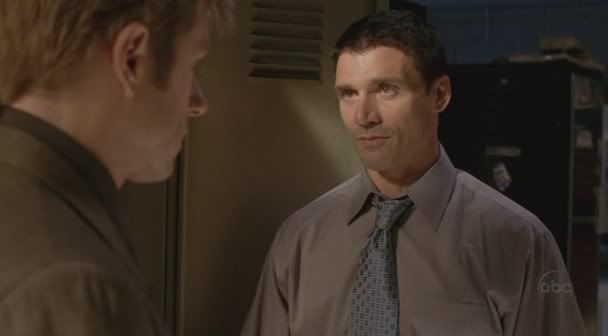

In the end, they reach a truce, for the same reason adversaries have always reached truces: each of them realizes that continuing hostilities is no longer a viable option. They seal their truce by telling each other, “See you tomorrow.”
Jim and Marty’s truce is tested at the very beginning of “Leap of Faith,” when Jim asserts they should look at Warren Doyle. It seems the truce isn’t working when Marty questions Jim about Doyle, and Jim responds, “I'm looking at him.” But Jim goes on to explain, “Marty, I knew this kid,” and Marty accepts his explanation. Later in the episode, Jim proves he can be a team player by consulting the other detectives about what to do about the embroidery receipt and actually listening to what they have to say. And after Jim beats up on Doyle, Marty even acknowledges Jim has “a hell of a left hook.”
In “In Your Face,” Marty’s wicked sense of humor reappears, but without the nasty undertone it had before. This time, much of the humor is at Karen’s expense. Even though Marty doesn’t know why Karen is mad at Jim, he seems perfectly willing to take Jim’s side against his female partner.
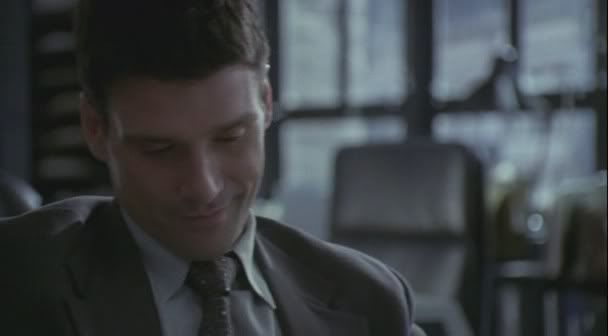
In spite of plying Jim with “wheatgrass juice” at the sports bar, Marty never finds out what Karen was so mad about. But as Jim leaves, Marty seems to experience an epiphany. After Jim asks directions to the subway and walks away, led by Hank, Tom turns to Marty and asks, “Can you imagine that?” Marty responds, simply, “No.”
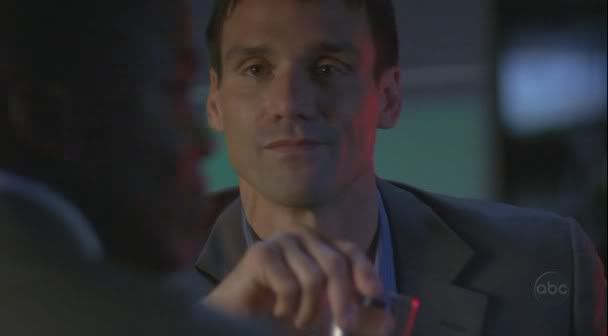
It’s truly amazing to see how much Frank Grillo puts into that single word. I’ve often wondered whether Marty had ever tried to “imagine that” before in the three months or so that he’d been working with Jim. Or had he been so caught up in his animosity toward Jim that he never thought about what it was like to be blind?
Whatever the reason, the new relationship between Jim and Marty is apparent in “Doggone.” Marty not only volunteers to play the role of the “blind drug dealer,” he is the one (other than Jim himself) who seems most upset when Hank is taken.
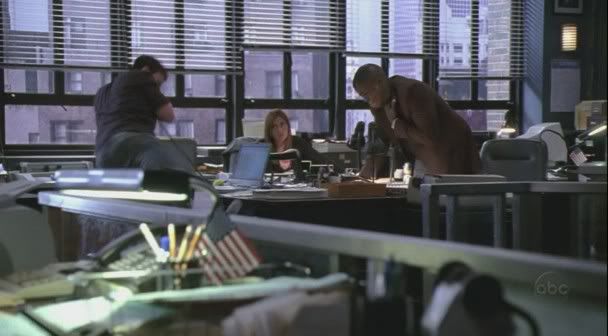
Jim cements their new relationship by dismissing the other detectives’ losing him with “what happened, happened” and by not revealing to the Chief of Ds that they lost him. Then, in a moment which would have been unbelievable only a few weeks earlier, Marty offers to take Jim to the East Village to look for Hank.
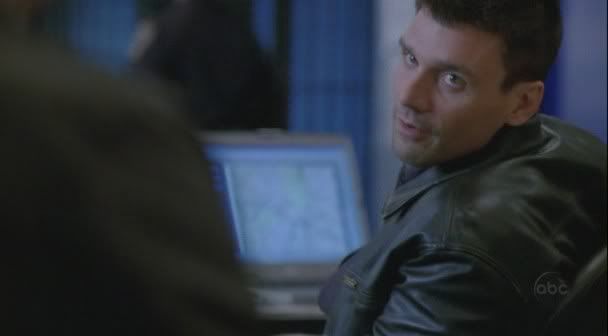
Jim and Marty are now getting along, but they still have issues, as is apparent in “Under the Gun.” Marty openly questions, once again, why Jim is carrying a gun.
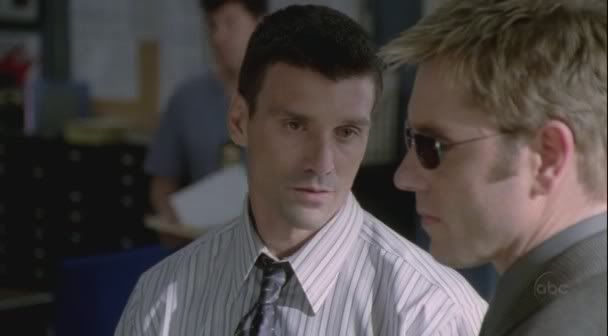
But he agrees to help Jim try to recover his gun, and to keep the missing gun secret from Fisk, in spite of his belief they should not be in that situation. In contrast to what he would have done earlier, Marty simply states his position, without giving Jim a hard time about it. Perhaps he simply doesn’t want to kick Jim when he’s down, this time.
Even after the gun is recovered, the issue of the gun doesn’t go away. At the beginning of “Fancy Footwork,” Marty guesses correctly that Jim was talking to Fisk about the gun, but Jim refuses to divulge the subject of their discussion. When Karen protests that Jim might as well be on modified assignment if he gave up his gun, Marty responds, “He is on modified assignment. He’s blind.”
Later, Marty, or Marty and Tom, come up with the idea of a “gift” of brass knuckles and a blackjack, “in case you decide to put your gun away.” Jim is not pleased. Doing a good imitation of Mt. St. Helen’s about to blow its top, he throws the "gift" on Marty's desk and stalks out of the squad room. Disregarding Karen’s and Tom’s advice to let it go, Marty follows Jim. But this locker room confrontation is different from the earlier ones. Marty tells Jim he’s earned his place in the squad and they have had his back, but he doesn’t need the gun and he’ll be a better detective, and they’ll be a better squad, without it.
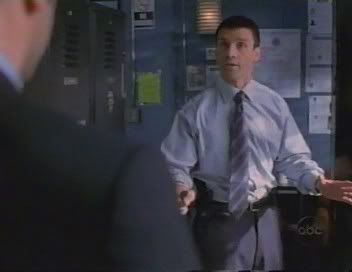
Having said his peace, Marty leaves Jim to ponder his words. And in another departure from the past, Jim apparently does consider what Marty has to say. It’s hard to say how much effect Marty’s words had on Jim’s ultimate decision. He was already thinking about giving up the gun, but he was still undecided that morning in Fisk’s office. I think Jim recognized that what Marty said was valid, and this was one of several things which led him to decide, finally, to give up the gun.
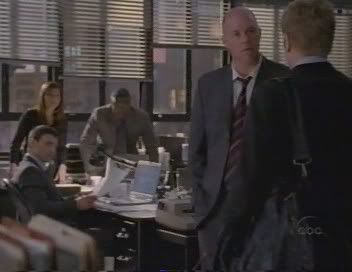
The creators of Blind Justice used the character of Marty to test Jim and to give expression to the questions and doubts they knew the viewers would have. Should a blind man be a detective in the first place? Can he have his partner’s back? Should he carry a gun? But they embodied these questions in a fascinating character who defied simple categorization. I only wish we had been able to see how the Jim-Marty relationship played out in (at least) a second season.
In the Pilot, Marty’s sour “We know,” in response to Jim’s statement that he’s assigned there, tells us (if we didn’t already know) that this guy is going to be Trouble.

Later, Jim’s challenge to Marty to take his gun, if he can, sets up Marty’s basic dilemma. He can’t physically fight Jim or force him out of the squad without being viewed as the bully. But if Jim “wins,” Jim will then be “the king.” Marty can’t win either way, and he seems to realize this on Jim’s second day back at work. Perhaps this is the origin of the nastiness which follows.

Then Jim makes Marty’s dilemma even worse by solving the “tongue collector” case, using a clever ruse to get Lyman to confess after Marty and Tom had worked on him for more than an hour, and demonstrating along the way that he is capable of defending himself and his gun, when Lyman tries to grab the gun.

Now this is a real problem for Marty, because he’s basically an honorable guy, who will give credit where credit is due. If Jim can close cases, what does this do to his basic belief that a blind man should not be a detective? Further complicating matters is the fact that Jim is a bona fide hero. Marty has to respect that, even if he sometimes seems to do so grudgingly (his “balls of steel at the bank robbery” remark, for example). And Jim doesn’t make things easy, either for himself or for Marty. As Karen astutely points out, his “bull in a china shop” approach alienates both Marty and Tom. But in his understandable desire to prove himself, Jim can only keep doing what he’s doing, at least at first.
One thing everyone can probably agree on is that Marty has a wicked and (at times) even cruel sense of humor. Not surprisingly, most of his humor is at Jim’s expense, and he is the only major character (as far as I can recall) who makes fun of Jim’s blindness. Some notable examples: His answer, “Bin Laden,” when the Criders’ dog is dug up in “Four Feet Under” and Jim asks what was found. And, of course, the “Helen Keller moment” comment when Karen draws Cheryl Vitti’s wound on Jim’s face, followed by his offer to draw a map on Jim’s face of the location of Condell’s apartment.

Does he make these kinds of jokes because he just isn’t a politically correct kind of guy? Or is it because he is not about to cut Jim any slack and thinks that if Jim is on the job, he should be able to handle this kind of thing? Or is he simply determined to make Jim’s return to work as difficult as possible, in hopes of forcing him to quit, because he thinks Jim shouldn’t be on the job?
In “Rub a Tub Tub,” it is apparent that the Jim-Marty conflict isn’t going to be resolved anytime soon. Marty moves his desk to retrieve a quarter and later leaves a chair out of place, and Jim runs into each of them. It is debatable whether Marty deliberately moved the furniture to trip up Jim, at least the first time, but he’s not displeased when the collisions occur. On the second occasion, Jim is clearly very angry, and he slams the chair back into place, scaring Hank.

This sets up the first memorable locker room confrontation between Jim and Marty. In spite of his anger, Jim extends an olive branch to Marty, telling him if he can ever do anything for him, he will do it, and asking if that isn’t preferable to their getting dug in. Marty is having none of it. He proposes taking up a collection to buy bells to put on the detectives and the furniture. Somehow refusing to be provoked, Jim tells Marty, “This is going to stop. I work here now, and I’m not going anywhere.” Marty responds with an implied threat, “Good luck with that.”

After the confrontation, the hostilities continue and even escalate in “Marlon’s Brando.” Jim suggests he and Marty need to “take a walk,” but when Fisk hears the comment, he warns both of them that the next one to make a comment will take a “rip.” When Jim and Karen return to the squad after Condell’s suicide, Marty seizes the opportunity to tell Jim that if anything had happened to Karen, he would have made it his life’s work to see Jim off the job.

For once, Jim has no response, probably because if anything had happened to Karen because of his inability to protect her, Marty would not have had to do anything to get Jim off the job.
In “Seoul Man,” the conflict escalates further. Kicking Jim when he’s down, Marty repeatedly reminds him of his failure to catch the perp at the robbery/homicide. This is one of the times when I truly dislike Marty. It’s also becoming painfully obvious (except, perhaps, to Jim and Marty) that everyone else in the squad is becoming tired of their continuous animosity and sniping. Fisk isn’t going to put up with it any more, and he calls them into his office, where he demands to know when they’re going to stop acting like “pissed off stepsisters.”

Even Fisk can’t end the hostilities, however. When they learn Dorsey was in the military in Korea and Jim tells Marty and Tom they need to talk to him again, Marty starts to go after Jim. Tom has to restrain him and asks Marty what’s wrong with him. Unusually for him, Tom is pretty fed up with Marty in this episode. When Tom says he’s not too proud to learn from Jim, Marty isn’t giving an inch and suggests Tom wear a blindfold. Disgustedly, Tom goes off to check out the witnesses, leaving Marty to stew. Marty finally goes too far with Fisk, when he suggests Jim is only declining an interview because the rest of them are present when Fisk asks him about it. No overtime for Marty this month.
It all culminates, of course, in the locker room. There is little to add to all that has already been said about this amazing scene. Marty knows, as he tells Jim, that he can’t “win,” and Jim knows they’ve got to work things out, because he can’t keep doing this. Marty accepts that Jim isn’t going anywhere (which is not the same as believing he should be on the job), and Jim “gets” Marty’s point that he needs to be a team player.


In the end, they reach a truce, for the same reason adversaries have always reached truces: each of them realizes that continuing hostilities is no longer a viable option. They seal their truce by telling each other, “See you tomorrow.”
Jim and Marty’s truce is tested at the very beginning of “Leap of Faith,” when Jim asserts they should look at Warren Doyle. It seems the truce isn’t working when Marty questions Jim about Doyle, and Jim responds, “I'm looking at him.” But Jim goes on to explain, “Marty, I knew this kid,” and Marty accepts his explanation. Later in the episode, Jim proves he can be a team player by consulting the other detectives about what to do about the embroidery receipt and actually listening to what they have to say. And after Jim beats up on Doyle, Marty even acknowledges Jim has “a hell of a left hook.”
In “In Your Face,” Marty’s wicked sense of humor reappears, but without the nasty undertone it had before. This time, much of the humor is at Karen’s expense. Even though Marty doesn’t know why Karen is mad at Jim, he seems perfectly willing to take Jim’s side against his female partner.

In spite of plying Jim with “wheatgrass juice” at the sports bar, Marty never finds out what Karen was so mad about. But as Jim leaves, Marty seems to experience an epiphany. After Jim asks directions to the subway and walks away, led by Hank, Tom turns to Marty and asks, “Can you imagine that?” Marty responds, simply, “No.”

It’s truly amazing to see how much Frank Grillo puts into that single word. I’ve often wondered whether Marty had ever tried to “imagine that” before in the three months or so that he’d been working with Jim. Or had he been so caught up in his animosity toward Jim that he never thought about what it was like to be blind?
Whatever the reason, the new relationship between Jim and Marty is apparent in “Doggone.” Marty not only volunteers to play the role of the “blind drug dealer,” he is the one (other than Jim himself) who seems most upset when Hank is taken.

Jim cements their new relationship by dismissing the other detectives’ losing him with “what happened, happened” and by not revealing to the Chief of Ds that they lost him. Then, in a moment which would have been unbelievable only a few weeks earlier, Marty offers to take Jim to the East Village to look for Hank.

Jim and Marty are now getting along, but they still have issues, as is apparent in “Under the Gun.” Marty openly questions, once again, why Jim is carrying a gun.

But he agrees to help Jim try to recover his gun, and to keep the missing gun secret from Fisk, in spite of his belief they should not be in that situation. In contrast to what he would have done earlier, Marty simply states his position, without giving Jim a hard time about it. Perhaps he simply doesn’t want to kick Jim when he’s down, this time.
Even after the gun is recovered, the issue of the gun doesn’t go away. At the beginning of “Fancy Footwork,” Marty guesses correctly that Jim was talking to Fisk about the gun, but Jim refuses to divulge the subject of their discussion. When Karen protests that Jim might as well be on modified assignment if he gave up his gun, Marty responds, “He is on modified assignment. He’s blind.”
Later, Marty, or Marty and Tom, come up with the idea of a “gift” of brass knuckles and a blackjack, “in case you decide to put your gun away.” Jim is not pleased. Doing a good imitation of Mt. St. Helen’s about to blow its top, he throws the "gift" on Marty's desk and stalks out of the squad room. Disregarding Karen’s and Tom’s advice to let it go, Marty follows Jim. But this locker room confrontation is different from the earlier ones. Marty tells Jim he’s earned his place in the squad and they have had his back, but he doesn’t need the gun and he’ll be a better detective, and they’ll be a better squad, without it.

Having said his peace, Marty leaves Jim to ponder his words. And in another departure from the past, Jim apparently does consider what Marty has to say. It’s hard to say how much effect Marty’s words had on Jim’s ultimate decision. He was already thinking about giving up the gun, but he was still undecided that morning in Fisk’s office. I think Jim recognized that what Marty said was valid, and this was one of several things which led him to decide, finally, to give up the gun.

The creators of Blind Justice used the character of Marty to test Jim and to give expression to the questions and doubts they knew the viewers would have. Should a blind man be a detective in the first place? Can he have his partner’s back? Should he carry a gun? But they embodied these questions in a fascinating character who defied simple categorization. I only wish we had been able to see how the Jim-Marty relationship played out in (at least) a second season.

